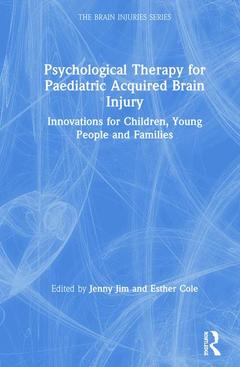Psychological Therapy for Paediatric Acquired Brain Injury Innovations for Children, Young People and Families The Brain Injuries Series
Coordonnateurs : Jim Jenny, Cole Esther

Children, young people and families living with an acquired brain injury (ABI), whether through accident, illness, injury or abuse, are rarely offered psychological therapy, and yet the benefits of such interventions can be profound. This important new book, providing a selection of practice examples and insights from frontline practitioners, will be essential reading for any paediatric therapist or clinician.
Beginning with a "life story" of the brain where emphasis is placed on how brain development is fundamentally related to its environment, the book offers key background knowledge before showcasing the core topics of assessment, psychological formulation and intervention. It features a range of therapeutic models, includes direct and indirect work, group work and family therapy, with settings varying from inpatient neurorehabilitation to community work and the transition to education. The long-term needs of those in the criminal justice system are also addressed. The closing chapters focus on the debate around effective outcome measurement and outline a vision for better services.
Elevating the voices of our children, young people and families living with ABI, this pioneering book will provide practitioners with the confidence to work collaboratively across a range of children and young people with disorders of consciousness or communication to those with behaviour that challenges others to manage. It offers new ways to understand both children?s pasts and their futures, and will be essential reading for anyone in the field.
List of illustrations
Editors’ acknowledgements
About the editors
List of contributors
Preface
Series editor’s foreword
Experts by experience reflections
INTRODUCTION
Jenny Jim and Heather Liddiard
PART I: GETTING STARTED
CHAPTER ONE
"My life story" by the brain
Jenny Jim
CHAPTER TWO
An introduction to paediatric acquired brain injury
Daniel Stark, Suresh Pujar, Isobel Heyman and Tara Murphy
CHAPTER THREE
Assessment in paediatric acquired brain injury
Suzanna Watson and Fergus Gracey
CHAPTER FOUR
Using biopsychosocial formulations in paediatric neurorehabilitation
Jenny Jim and Heather Liddiard
PART II: INNOVATIONS IN PSYCHOLOGICAL THERAPY
CHAPTER FIVE
Narrative-inspired interview with the brain
Jenny Jim
CHAPTER SIX
Child-centred play therapy for trauma: from non-verbal to narrative expression
Anne Fullalove
CHAPTER SEVEN
Structured narrative therapy for children with severe acquired brain injury and severe communication difficulties
Alison Perkins
CHAPTER EIGHT
Systemic and narrative therapeutic work with families whose child has sustained a profound brain injury
Rachel Ames
CHAPTER NINE
Narrative approaches for behaviour that challenges post-injury
Esther Cole
CHAPTER TEN
The ‘Beads of Life’ approach adapted for young people with an acquired brain injury
Sara Portnoy and Liz Ireland
CHAPTER ELEVEN
Systemic storytelling following childhood acquired brain injury: a family business
Sarah Helps
CHAPTER TWELVE
Psychotherapy for children and young people with brain injury in conflict with the law
Huw Williams, James Tonks, and Simone Fox
CHAPTER THIRTEEN
The road to transition: a SHARED model
Laura Carroll, Elizabeth Roberts and Gemma Costello
PART III: WHAT DIFFERENCES CAN WE MAKE?
CHAPTER FOURTEEN
Reflections on outcome measurement in child neuropsychological rehabilitation: a child-centred approach
Katie Byard and Sophie Gosling
CHAPTER FIFTEEN
Our children do deserve better
Jenny Jim, Heather Liddiard and Esther Cole
Appendix: Theory-practice links in "Narrative inspired interview with the brain"
Name index
Subject index
Jenny Jim (DClinPsy, MSc, BSc (Hons)) is a Consultant and Principal Clinical Psychologist with a passion for improving the lives of children, young people and families affected by acquired brain injury. Dr. Jim is the Deputy Programme Director (Clinical) of the Professional Doctorate in Clinical Psychology at the University of East London. She is a clinical academic who works with families, develops and researches innovations, lectures and trains clinical psychologists for the NHS.
Esther Cole (PsychD, MA (Oxon.)) is a Highly Specialist Clinical Psychologist who worked in the NHS for 12 years in different roles and now works in the private sector across the lifespan. Her most recent position is within a community multidisciplinary paediatric therapy centre in South West London. Dr. Cole's therapeutic orientations and research interests are broad and include investigating the effective integration of psychological approaches for adults and children with mental health and neurological conditions.
Date de parution : 10-2019
15.6x23.4 cm
Date de parution : 11-2019
15.6x23.4 cm
Thème de Psychological Therapy for Paediatric Acquired Brain Injury :
Mots-clés :
ABI; paediatric neuropsychology; La Trobe Communication Questionnaire; paediatric neuro-rehabilitation; Wellness Recovery Action Plan; neuropsychological assessment; UK Rehabilitation Outcome Collaborative; care pathways; Cognitive Behaviour Therapy; PTSD; Paediatric ABI; play therapy; Goal Attainment Scaling; Autistic Spectrum Disorder; Parental Mental Health Difficulties; family therapy; Young Man; children and young people; Non-traumatic Acquired Brain Injuries; group work; Childhood ABI; acquired brain injury; Prism Model; psychological therapy; Profound Brain Injury; Child Centred Play Therapy; ICF Framework; Gas Goal; Spinal Cord; CAMH Service; Paediatric Neurorehabilitation



